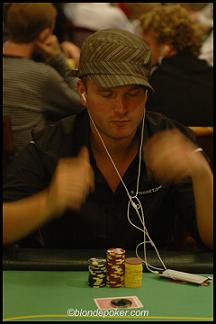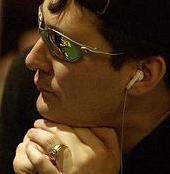 You cannot fail to have noticed the predilection of poker players for gadgetry, most obviously, since its invention, the wonderfully packaged MP3 player known as the Ipod. Take this year’s World Series Main Event, for example. Thousands of players, and at least one on each table with those instantly recognisable white headphones snaking down to their portable music supply. What benefit is gained from listening to Led Zeppelin or Frank Sinatra while playing the stamina-testing marathon that is a four-day tournament? I have asked a lot of players I’ve seen wearing one why they do it, and have had some interesting answers, which I think bear revealing.
You cannot fail to have noticed the predilection of poker players for gadgetry, most obviously, since its invention, the wonderfully packaged MP3 player known as the Ipod. Take this year’s World Series Main Event, for example. Thousands of players, and at least one on each table with those instantly recognisable white headphones snaking down to their portable music supply. What benefit is gained from listening to Led Zeppelin or Frank Sinatra while playing the stamina-testing marathon that is a four-day tournament? I have asked a lot of players I’ve seen wearing one why they do it, and have had some interesting answers, which I think bear revealing.The most common reason given for wearing headphones, in tournaments particularly, and under that heading, in high-buy in, slow structure tournaments especially, is to “increase concentration.” Sounds good. So how does it work? In two ways – firstly, by setting the game to a soundtrack, people swear that they pay more attention, and not less (as one might expect) to what is going on around them. Extra focus on players’ betting patterns and chip stacks, pot size and all the other sources of information is therefore maintained, and for a long time after players begin to tire and lose concentration.
Secondly, and most interestingly, several top UK players (who shall remain nameless for fear of alienating would-be chatters) said that avoiding talking with the other players at the table was a goal always wished for, and with the advent of the Ipod, attainable at last. Without the desire or the need to engage in distracting banter, attention may be directed entirely at the players themselves: their body language, chip fiddling, bet size etc. So no fun around the kitchen table, then.
So why, when in Vegas just recently on holiday, did I find people listening to Ipods in relatively small cash games and low buy-in tournaments? Surely the benefits of that extra insulated concentration will only be felt in an environment where players are sat with the same people for extended periods of time, and required to play solidly for days on end. Not so, assured one young player, who had to keep “taking out his ear” to talk to me, which I hoped was not an imposition. He told me that loud music kept him awake, and stopped him getting bored. Another benefit! Boredom is quite obviously a major enemy, especially in cash games, and the only thing worse than boredom, he said, and I paraphrase, was the reckless play and ensuing tilt which followed.
I was sold. I received an Ipod for my birthday and set about filling it with aggressive music like Aphex Twin and early nineties Hip-Hop and considered wearing it to my local £20 rebuy tournament. That turned out to be counterproductive as I felt like raising all the time, never seemed to remember when it was my go and had to be tapped on the shoulder by the waitress whenever my drink arrived. I learned an Ipod-poker lesson: don’t listen to any music you pay more attention to than the game. Choose something soothing or absorbing, not something you’ll start singing along to, unless you are of the unusual temperament which allows for that kind of multitasking. Also, there is little more annoying than having to listen to someone singing along to ‘Dancing Queen’ as well as taking your money.
 So take two with the Ipod was in a slightly higher buy-in no-limit hold’em freezeout. I had seen Phil Hellmuth on one of the early televised WPT events talking about his own music-listening tendencies. There are probably few players others try harder to wind up or have a little chat with at the table, so from that angle the Ipod is probably pretty helpful. I remember him saying that when a crucial hand develops later in a tournament, he sneakily turns off the music leaving his earphones in, so that he can hear everything his opponents say while they remain blissfully unaware. That sounded like a plan. Unfortunately, being less at ease with the controls of my device than Phil, it was painfully obvious when I was trying to pause the playlist, and usually I found myself holding up the action to do it. I did find, however, that with the music down to cab-driver level (where you can just about make out the lyrics) there was no need to pause it and I could hear what was being said around me.
So take two with the Ipod was in a slightly higher buy-in no-limit hold’em freezeout. I had seen Phil Hellmuth on one of the early televised WPT events talking about his own music-listening tendencies. There are probably few players others try harder to wind up or have a little chat with at the table, so from that angle the Ipod is probably pretty helpful. I remember him saying that when a crucial hand develops later in a tournament, he sneakily turns off the music leaving his earphones in, so that he can hear everything his opponents say while they remain blissfully unaware. That sounded like a plan. Unfortunately, being less at ease with the controls of my device than Phil, it was painfully obvious when I was trying to pause the playlist, and usually I found myself holding up the action to do it. I did find, however, that with the music down to cab-driver level (where you can just about make out the lyrics) there was no need to pause it and I could hear what was being said around me.One aspect of having this continual external stimulation which I did find very helpful was the bad-beat remedy it provided (also good for unforced errors). When something went horribly wrong, regardless of who was at fault, I found it much easier to draw a line beneath it and pay attention to the here and now. This is extremely valuable; moving on and playing the next hand to the best of one’s ability is a tremendous asset. Nothing blows the rest of your stack like blowing part of your stack, and the Ipod helps you to start over quickly.
This leads me to the final Ipod test – internet poker. I may not have got the hang of utilising the little device in live games, but it is great to have playing while pressing those buttons online. For a low-limit multitabler like myself, the boredom of playing fairly tight and waiting for other people to self-destruct is a worry, and the Ipod clears that right up. For those marathon 1000+ player tournaments, too, it is a blessing. Into the fifth hour with over 100 left? No problem, just put it on shuffle and let your random tune selection keep your eyes on the game and the moves of the other players. Again, the biggest asset was its remarkable power to move me through the unfortunate downs which inevitably accompany the ups. I had a slight aversion to the tune I was listening to when my Queens were busted by Fives for a few days, but this was the only side effect.
 As with the wearing of sunglasses, if so many people do it, there’s something in it. Any personal advantage which can be gained, in my opinion, might as well be. I have even seen sunglasses with an MP3 player built in around the ear area. Just remember that if you make that final table, you’re unlikely to be allowed this gadget – at all the big tournaments I’ve watched recently, they’ve made an announcement outlawing them at the final. I am sure there must be some way to turn the whitely innocent-looking device into some kind of potential cheat, but the point is that it’s not a good idea to become reliant on any instrument for your poker wellbeing. If you can’t keep your mind on the game without an Ipod, you probably won’t be able to with one either.
As with the wearing of sunglasses, if so many people do it, there’s something in it. Any personal advantage which can be gained, in my opinion, might as well be. I have even seen sunglasses with an MP3 player built in around the ear area. Just remember that if you make that final table, you’re unlikely to be allowed this gadget – at all the big tournaments I’ve watched recently, they’ve made an announcement outlawing them at the final. I am sure there must be some way to turn the whitely innocent-looking device into some kind of potential cheat, but the point is that it’s not a good idea to become reliant on any instrument for your poker wellbeing. If you can’t keep your mind on the game without an Ipod, you probably won’t be able to with one either.